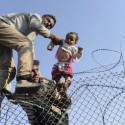Painful Refugee Day, Feverish Year for Ankara
By Abdennour Toumi

Ankara, Turkey — The Syrian conflict has produced the most compelling humanitarian challenge of the last fifty years. According to the UNHCR (U.N. High Commissioner for Refugees) office, there re 12.2 million people in need of humanitarian assistance including 3.9 million who fled Syria and 7.6 million internally displaced persons within the country itself. Turkey has become host to the largest influx of refuges of any country in the world according to a statement by High Commissioner António Guterres in a meeting of NGO and INGOs held in Istanbul on June 17th.
These numbers amply continue to rise, and the obstacles to the solution of the crisis remain elusive. Turkey has done an excellent job of hosting and providing for the Syrians and has received praise for its efforts from the international community. More recently the U.N. and other INGO’s have lauded the Turkish government and local NGOs for their dedication and sustained efforts on behalf of the refugees over the past four years.
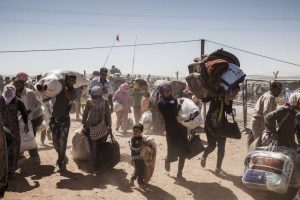
There are, however, more long-term obstacles that need to be addressed in order to contain the potential fall-out from the integration and post-integration of the Syrian refugees. As the conflict in Syria continues, the virtual risk to social cohesion in the border cities of the host country threatens to rise. The international community needs to assume a more efficient and substantial role in relieving Turkey of this enormous burden.
Turkey’s “open-door” policy provides a political infrastructure regarding both camp and non-camp refugees, legal framework, integration, the international community’s response, and the impact on Turkish public policy choices both foreign and domestic.
Currently the majority of the Syrian refugees in Turkey have temporary protection status. Turkey practices a non-refoulement policy and admits refugees fleeing from conflicts in Syria and Iraq. The government is maintaining implementation of its open-door policy toward the refugees, but it is becoming increasingly difficult to maintain, especially in face of a potential new influx of refugees.
For instance, if ISO would expand its territory, a slim possibility as they were defeated in Kobani and recently in Tel-Abeid, a renewed crisis along the border might spur a new influx of refugees in Șanliurfa province.
Turkey will most likely accept more refugees under the paradigm of its open-door policy, but it would further drain the country’s financial capacity to host them. Certainly a new wave of refugees would ensure increased pressure on the already strained resources available. Indeed, the Turkish government has already spent over 5 billion dollars to handle the humanitarian crisis on its southern borders and in the big Anatolian cities.
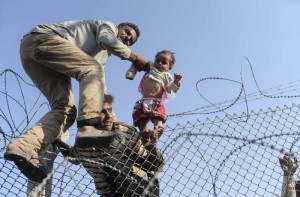
Without the support of the international community, the Turkish government faces a deepening hardship in handling this humanitarian disaster, one which threatens to become a national security nightmare.
Without sufficient assistance from the international community, the financial burden of the host country could jeopardize public policy in terms of housing, education, labor and most certainly domestic security. At this point, the Turkish government will be obliged to re-evaluate its open-door policy in view of the June 7th election outcome.
There is a general dissatisfaction felt over the international community’s level of effort to support Turkey in meeting the refugee challenge. Both government and non-government officials alike share their disappointment at the seeming lack of concern on the part of the international community and the role it has played.
Turkey shelters are the largest number of refugees in the world with very little support from other countries. So on the occasion of World Refugee Day, President Anne Brasseur of the Parliamentary Assembly of the European Counsel (PACE) stated, “Member states must face their responsibilities toward refugees in need of protection.”
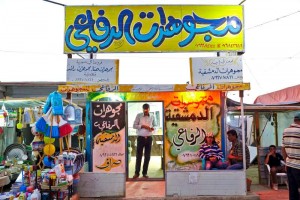
The Turkish government assumed full responsibility from the beginning which meant that UNHCR and ECHO played a more secondary role. In any case, UNHCR continues to struggle to meet the most basic needs of refugees, but its urgent appeals for assistance go severely underfunded.
UNHCR remains the biggest organization representing the international community in Turkey. It has a variety of projects and it cooperates with AFAD inside and outside the camps. Moreover, UNICEF works on health, education, and psycho-social support for children. While officials acknowledge some help from the international community through UNHCR and UNICEF, the overwhelming view is that they are exceedingly insufficient.
It should be noted that in addition to the general disappointment over the international community’s lack of sufficient support, there are also some misperceptions abut international organizations’ activities and agendas.
Humanitarian aid policies became one of the major Turkish foreign policy determinants in the wake of the Syrian civil war. Although Turkish foreign policy was initially challenged in light of the so-called Arab Spring, its open-door policy vis-à-vis the hosting of Syrian refugees was at first explicitly based on humanitarian aid, then later on military development on the ground.
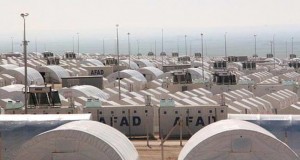
The Kobani crisis allowed an implicit shift from humanitarian aid to only para-military/military assistance, creating a military corridor (buffer zone) between the two countries’ borders and allowing the Peshmerga forces to cross into Kobani.
Since the siege of Kobani, more recently the June 7th election, and the question of security in Tel-Abeid, an interesting element has emerged. Public opinion has it that the Kurds in particular are pressing Ankara to change its foreign policy regarding Syria with, so far, no dramatic shift but one foreseen in the near future.
Continued lack of Western response will only reinforce the common Turkish view that the West favors only its strategic and political interests. Current events and the dynamic of on-going conflicts have seen new imperatives emerge, and the concern on the Turkish side is shifting from humanitarian aid to a security paradigm.
Turkey has been the most generous country in providing humanitarian aid at all levels to Syrian refugees affected by these tragic circumstances. But unless it receives substantial and sustained support from the international community, it is fast approaching a crossroads of decision that will affect the lives of millions both inside its borders and beyond.


- The Israeli-Palestinian Conflict: Is the Neither-Peace-nor-Security As-sumption Dominating Again? - June 7, 2021
- Algeria: “I Can See Clearly Now” - August 5, 2019
- Majesty Mohammed VI and General Gaïd Salah Tear Down This Wall! - July 29, 2019













